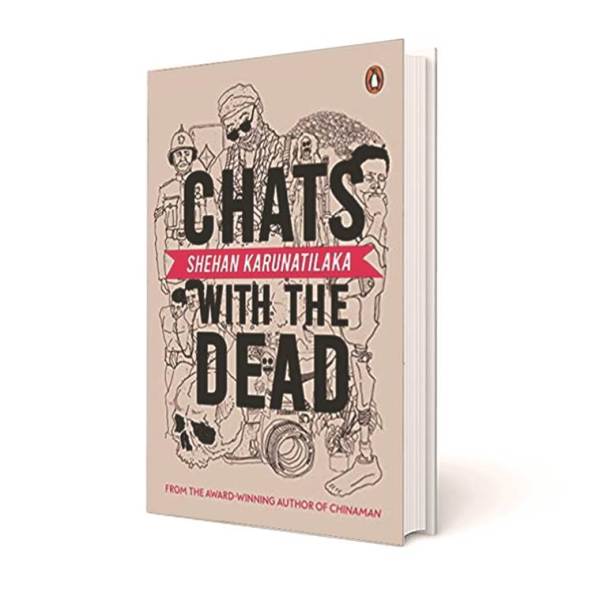 Shehan Karunatilaka
Shehan Karunatilaka
Chats with the Dead
Shehan Karunatilaka
Penguin Hamish Hamilton
400 pages
Rs 599
The brutal cynicism that permeates every moment of Shehan Karunatilaka’s second novel, Chats with the Dead, could have easily been paralysingly depressing in the hands of a lesser writer. But such is his skill — and wit — that terrible truths and cruel ironies are handled with an enviable effortlessness, that gives the book a surprising and charming buoyancy. A line like this — “Follow any turd upstream and it leads to a member of Parliament” could have been terrifying on account of its truth, instead it is funny.

Malinda Alberta Kabalana — “photographer, gambler, slut” — is the main figure in this book. Currently, he is dead and caught in the afterworld, where, upset and confused dead people are made to stand in queues and fill out paperwork before being ushered off for further processing. The banality and government office feel of this place is a pitch-perfect subversion of the conventional, religious idea of going to a better place after death. This is one of many fittingly harsh comments made on religion’s false promises in this book. One particularly wonderful section titled ‘Chats with the Dead Atheist’ makes this seldom acknowledged but inescapable point: “We are a flicker of light between two long sleeps.” In this “flicker” of life, Malinda was a war photographer. But now he has to solve his own murder, because he can’t remember how he died.
The idea of a dead person solving his or her own murder is not new in fiction but the logic of this afterworld is unique: A ghost (or spirit) can only travel to places where his name is being or has been spoken; and when not actively trying to appear in such places, a ghost is at the mercy of winds (leading to some delightful “bus surfing” scenes). This is an elegant and brilliant solution to the eternal problem with the logic of ghosts: why are they where they are and where can they go? What kind of agency do they have? Using this supernatural ability to travel, Karunatilaka solves another eternal problem in fiction: how to make a character navigate time and space. The genius of this travel arrangement is that Malinda races from relevant scene to relevant scene and thus completely eliminates the need for filler narration such as: “X opened the door and entered the room,” or “he walked down the dusty road”. This is also a new way of experiencing an omniscient narrator.
This narrative technique has the effect of supercharging the story. There is hardly any breathing space and this, strangely, left me slightly unmoved. This could have been a profound book, but its pace makes that impossible. Some lines were so good that I felt sad they weren’t deemed worthy of deeper exploration and are instead raced over in the breathless pace of the plot.
The strength of this novel lies in its social realism. The background to this spiritual murder mystery is the Sri Lankan situation of 1989: The government is in an all-out war against the LTTE. A brutal and cruel Indian Peacekeeping Force lurks in the north and although present at the behest of the government, have become so bad that even the government wants them out. The JVP, a student-led, armed Communist rebellion is attempting to take power for the second time. All sides view human rights as some kind of joke or fantasy and the UN is useless as ever. Questionable NGOs, shady individuals, foreign spies and corrupt policemen play their own little games. The nexus between government, goons and the police, that is so common in the developing world, has seldom been explored in a funnier or more terrifying way.
In the middle of this grand theatre of cruelty and massacres are Malinda’s fake girlfriend Jaki, real boyfriend DD and his pitiless mother, who are trying to find their “disappeared” loved one, illustrating among other things, the fate of civil war-torn Sri Lankan families, and the ever present question of the meaning of life — a question that becomes all the more pressing in death.
Malinda’s sexuality and his relationship with Jaki as his friend and DD as his lover make for the most touching parts of the book (apart from one specific war scene which is so sad that I wish I could tell you what it is so you can skip it and avoid crying for hours). It also explores the question of what it was like to be a closeted gay man in 1989 Sri Lanka and also what it is like to be, in his own words, a “slut”.
The terrific pace of the plot and the energetic flow of Karunatilaka’s language is upset at times by the occasional clunky or cliched phrase or cliched image. I was particularly disappointed by the image of the Mahakali, who after a tense build-up, ends up looking like any other black, bloody, flesh-wearing beast from any number of lesser fictions. But these complaints are minor. Karunatilaka’s brutally effective mix of sharp observation and sharp humour doesn’t spare anyone. Moments of deliciously funny social commentary like this — “‘At least Muslims don’t kill Muslims,’ says Cassim and the other two stare at him. ‘In Sri Lanka, I mean,’ he clarifies” — are commonplace.
It is clear that Karunatilaka is a fearless writer, perhaps the most important quality in a writer. It also helps that he is astonishingly funny. Together, these qualities make Chats with the Dead a fascinating read.
Roshan Ali is the author of Ib’s Endless Search for Satisfaction